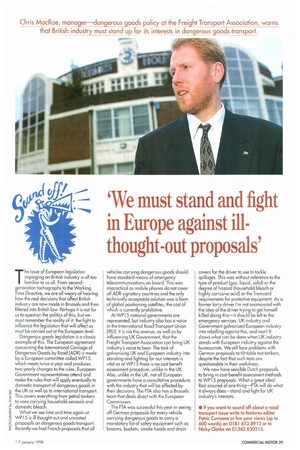'We must stand and fight
Page 41

If you've noticed an error in this article please click here to report it so we can fix it.
in Europe against ill thought-out proposals'
The issue of European legislation impinging on British industry is all too familiar to us all. From secondgeneration tachographs to the Working Time Directive, we are all weary of hearing how the real decisions that affect British industry are now made in Brussels and then filtered into British law. Perhaps it is not for us to question the politics of this, but we must remember the reality of it: the fight to influence the legislation that will affect us must be carried out at the European level.
Dangerous goods legislation is a classic example of this. The European agreement concerning the International Carriage of Dangerous Goods by Road (ADR) is made by a European committee called WP15, which meets twice a year and produces two-yearly changes to the rules. European Government representatives attend and make the rules that will apply eventually to domestic transport of dangerous goods in the UK as well as to international transport. This covers everything from petrol tankers to vans carrying household aerosols and domestic bleach.
What we see time and time again at WPI 5 is ill thought-out and uncosted proposals on dangerous goods transport. Recently we had French proposals that all vehicles carrying dangerous goods should have standard means of emergency telecommunications on board. This was impractical as mobile phones do not cover all ADR signatory countries and the only technically acceptable solution was a form of global positioning satellites, the cost of which is currently prohibitive. At WP1 5 national governments are represented, but industry also has a voice in the International Road Transport Union (IRU). It is via this avenue, as well as by influencing UK Government, that the Freight Transport Association can bring UK industry's voice to bear. The task of galvanising UK and European industry into standing and fighting for our interests is vital as at WP1 5 there is no cost benefit assessment procedure, unlike in the UK. Also, unlike in the UK, not all European governments have a consultative procedure with the industry that will be affected by their decisions. The FTA also has a Brussels team that deals direct with the European Commission, The FTA was successful this year in seeing off German proposals for every vehicle carrying dangerous goods to carry a mandatory list of safety equipment such as brooms, buckets, smoke hoods and drain covers for the driver to use to tackle spillages. This was without reference to the type of product (gas, liquid, solid) or the degree of hazard (household bleach or highly corrosive acid) or the Tremcard requirements for protective equipment. As a former lorry driver I'm not enamoured with the idea of the driver trying to get himself killed doing this—it should be left to the emergency services. UK industry and Government galvanised European industry into rebelling against this, and won! It shows what can be done when UK industry stands with European industry against the bureaucrats. We still face problems with German 'proposals to tilt-table test tankers, despite the fact that such tests are questionable in their usefulness. We now have sensible Dutch proposals to bring in cost-benefit assessment methods to WPI 5 proposals. What a great idea! Rest assured of one thing—FTA will do what it always does—stand and Fight for UK industry's interests.
















































































